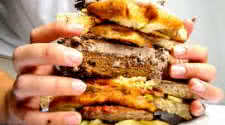Practical Nutrition: Late Night Feasting & Bodybuilders

Applied Source Used - April 1993 - American Journal of Clinical Nutrition
Bodybuilders and others who are trying to reduce bodyfat are often advised to avoid late-night meals. The idea behind this advice is that you should consume the bulk of your calories when you're most active, such as before a workout, so the calories will be used as fuel and not
stored as bodyfat.
Past research disputed this idea, however. A few studies showed that when you eat is less important than your total weekly calorie intake, and scientists made the assumption that you don't get fat immediately but instead have a biochemical grace period of about 72 hours before
excess calories merge into your fat cells. If you lower your calories over the next two days, or better yet, lower your calories and increase your physical activity, you can still nullify the excess calories. Even so, more recent evidence indicates that late-night meals may indeed
promote greater fat deposition.
It has to do with a process called diet-induced thermogenesis, or DIT, which involves the way calories from meals are turned into heat, or energy. Generally speaking, when increased metabolism, in this case from the DIT, converts calories to energy, they can't be stored as bodyfat.
In a study reported in the April '93 issue of the American Journal of Clinical Nutrition, nine men ate morning, afternoon or late-evening snacks on three separate days over five weeks. After carefully monitoring these subjects, the researchers found a big difference in calories
converted into energy from the morning and late-evening meals, specifically that the late-evening meals indicated a blunted DIT effect as compared to the morning meals. The afternoon meals, on the other hand, showed no big effect either way.
As to what promotes this rise in metabolism after a meal, scientists can't say for sure, They suspect it has something to do with the regular flow of hormones controlled by an internal body clock. Apparently, these hormones are more active earlier in the day. While eating a late-night
snack won't really destroy a diet, the calories you consume at that time do have a greater chance of being converted into bodyfat and sticking with you.
Why You Crave Fat
What makes it go hard to stay away from fatty foods, such as a good juicy steak or an extra-cheese pizza? Some say it's because foods that are rich in fat take longer to digest, providing a greater feeling of fullness. Earlier research implicated other substances in the body that stimulated fat intake; for example, a hormone called cholecystokinin, or CCK. CCK is secreted by cells in the upper intestine, and it stimulates the gallbladder to release bile. The digestive system needs bile to emulsify fat particles, or turn them into smaller particles.CCK is also secreted in the brain, and when injected into the brains of rats, it completely wipes out the animals' desire for fat foods. Recent research, however, indicates that your desire for high-fat foods is controlled by the balance of two brain proteins. One protein, galanin, rises gradually during the morning and into the evening, and it stimulates a craving for fats. In humans the substance peaks in teenage girls, causing them to consume more fat, which in turn produces the increased bodyfat needed to support a future pregnancy.
Galanin is balanced by another newly discovered brain protein. enterostatin. When this substance was injected into rats, the animals consumed 50 to 80 percent less fat. While most proteins taken orally are degraded into amino acids in the stomach, a few scientists envision a pill form of enterostatin in the future that will retain the fat-eschewing effect. In animals this protein causes a 50 percent reduction in weight-almost entirely from bodyfat.
The bad news is that such a pill won't be available for at least eight years. Until then keep away from the pizza and focus on fish.